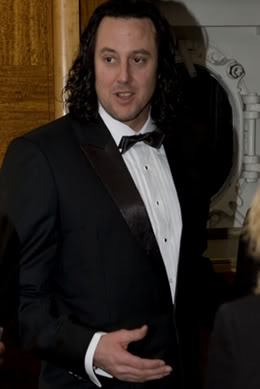 Interconnectivity. Integrity. Immortality.
Interconnectivity. Integrity. Immortality.
The words danced through my head as I sat at my reserved banquet seat on the Queen Mary Saturday night awaiting the man of the hour, Aaron Cohen. The Immortal Chaplains Foundation was honoring Cohen with the Prize for Humanity for his work as a slave hunter, as detailed in a June 2007 OC Weekly story by Christine Buckley.
The seeds of interconnectivity – the theme that would transcend all others, both the night of the awards ceremony and later, the following day, in a phone interview with Cohen – were planted the moment I sat down fell into conversation with my tablemates.
To the right of me sat a couple, Bill and Kay Thorpe, who had met Cohen at a wine tasting. The Thorpe’s childcare provider was the same Cambodian woman that tended to Cohen’s four-bedroom house while he was away on his life saving, as well as life threatening missions of rescuing women and children from the atrocities of slavery. When they heard about The Immortal Chaplain Foundation’s decision to bestow the prize on Cohen, they felt compelled to attend the event.
“What a small world, right?” Remarked Kay Thorpe.
A small world, indeed. A seemingly innocuous Cambodian woman, who served an everyday couple and their children in one capacity, and a “slave hunter” in another, brought the three otherwise strangers together. An obscure foundation that immortalizes the vision that Cohen and others like him strive to fulfill, would reunite them on a ship, of all places.
]
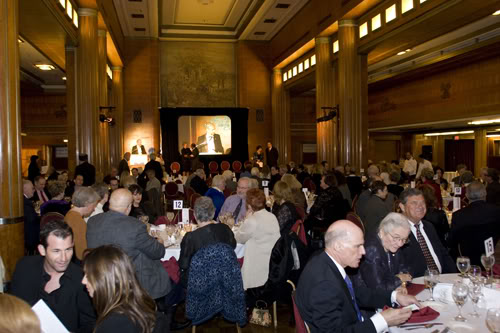
The Grand Salon on the second deck of the Queen Mary
Interconnectivity.
The ship is important. For, it was on an Army troopship, in 1943, that four chaplains – two Protestant pastors, one Catholic priest and a Jewish rabbi – banded together, arms linked, to face death after giving up their life jackets to World War II servicemen fleeing the torpedoed vessel. It took 18 minutes for the hit Dorchester to sink after the German submarine’s torpedo attack, and according to the Immortal Chaplains Foundation literature, “witnesses [of the event] tell of the final vision of the four Chaplains standing arm-in –arm on the hull, each praying, in his own way for the men.”
The Immortal Chaplains Foundation memorializes and brings to life the immortal integrity of the four men, who, long before the advent of interfaith coalitions present in today’s society, transcended the man- made constraints of religious differences and united to save the lives of men they barely knew, huddling together to bring into fruition the vision of “oneness.” A vision that is carried out in the works of Cohen and the other esteemed humanitarians present at Saturday night’s ceremony.
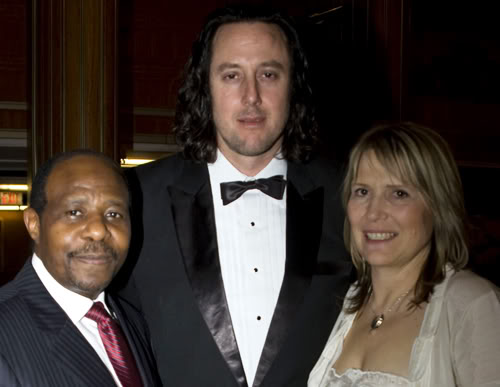
From left to right: Paul Rusesbagina, Aaron Cohen and Molly Bedingfield
The theme of interconnectivity continued to weave itself into the cloth cloaking the chilly night. It would be the fabric of the following day’s interview with Cohen – where he shared that the event afforded him the opportunity to meet, and quickly establish a new friendship with Paul Rusesbagina, the 2000 recipient of the Prize for Humanity, and a veritable force for human rights in his own right. Rusesbagina personally presented the award to Cohen with a moving speech that humbled all present.
For those unfamiliar with the name Rusesbagina, the movie Hotel Rwanda was predicated on the risks he took to save 1,000 Tutsi members in the 1994 genocide of the Rwandan war. Genocide that, for the most part, the rest of the world ignored. As Cohen put it over the phone, “no good deed goes unpunished” and the maxim applies to Rusesbagina. Even today, 14 years after his heroic acts, Rusesbagina dons a Kevlar vest as his every day attire when visiting his home country.
Two men – formerly strangers – brought together in friendship through a shared award and a common cause on a docked ship.
Interconnectivity.
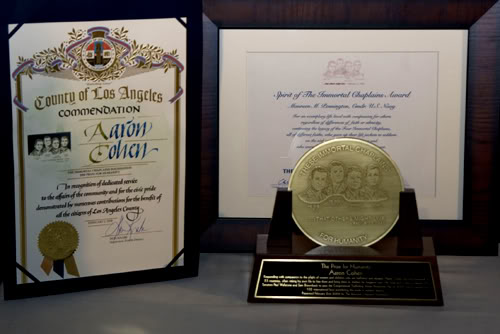
The Prize for Humanity
The seeds that would grow into a vine extending to the Immortal Chaplains Foundation and pulling me into the night’s event were originally planted by Buckley in her Weekly piece about Cohen. A woman whom I’d never met had set the stage for my first OC Weekly assignment, and my introduction to a world of heroes.
Interconnectivity.
As I tracked Cohen, with two cameras strapped around my neck and extra lenses affixed to my back in an effort to photograph the ceremony, it dawned on me that I was in the midst of angels. Present at the event were not only Cohen and Rusesbagina, but Molly Bedingfield (of the illustrious Global Angels Foundation based in London), Navy Commander Maureen Pennington (who, on the previous night was awarded the Spirit of the Immortal Chaplains Award) and four present day “immortal chaplains” of different faiths, each offering their own unique meditation towards the end of the ceremony, just to name a few.
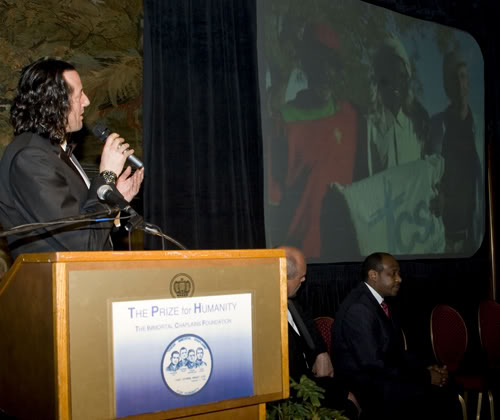
Cohen shows the crowd pictures of his work
As I stealthily stalked the night’s honoree, Cohen, and his presenter, Rusesbagina, I was struck by the effusive affability of both men. Cohen’s personality manifested itself in a manner one might find in a dignitary making his rounds on the floor of the U.N. Council.
Rusesbagina exuded a childlike demeanor every time I got close with the camera – his facing lighting up with a quiet, yet humble dignity, with a twinkle in his eye to match.
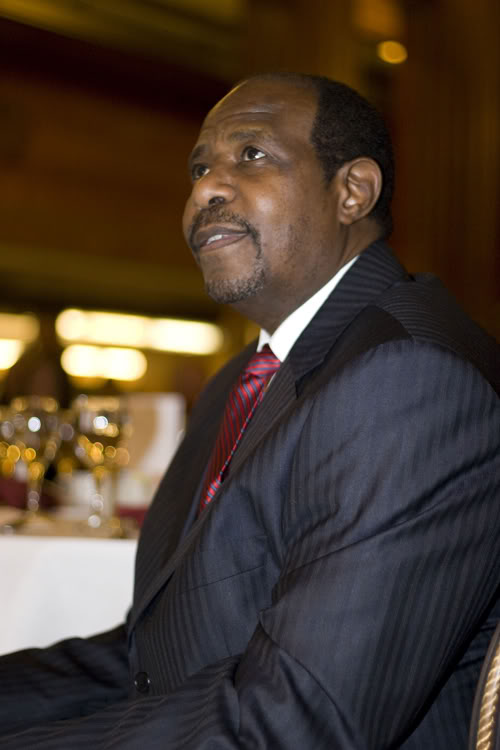
Paul Rusesbagina
Although my mission for the night was to cover and photograph the event, which culminated in a heart- wrenching slide show presented by Cohen during his acceptance of the award, and the soul soothing soliloquies of the four chaplain’s meditations, it would seem remiss of me to not touch upon Cohen’s life work and vision – the very things that landed me on the Queen Mary that night in the first place. And the very things that afforded me the privilege to mingle with heroes. For, that was truly what the night was about – the heroes of our time, with one hero in particular exemplifying the vision of those that came before him and setting the example for those that might follow.
Cohen wouldn’t call himself a hero, as I would soon discover, he’s far too modest for that and leaves the hero talk to those who came to honor him at the ceremony. He is, however, well sought out, and busier than any man I’ve thus encountered.

Navy Commander Maureen Pennington was awarded with the Spirit of the Immortal Chaplains Award Friday night
I was pleasantly surprised when Cohen made himself available for a phone interview the next day. A more detailed account of Cohen’s work can be found in Christine Buckley’s aforementioned article, so here, I will merely expound upon the nature of the man that composes Cohen’s character, and briefly describe what his work encompasses.
At the risk of oversimplification, Cohen spends his life as an operative for human rights. He has risked his life in over 23 countries through the course of the past decade to free slaves from the human trafficking trade. It all began, initially in a partnership with Perry Farrell, when upon being recruited by Farrell’s manager who took an interest in Cohen’s writing; he worked his way up to executive and director of Farrell. With the funds accrued from the success of Lollapalooza, Cohen and Farrell embarked on a mission to buy slaves from human traffickers in Sudan.
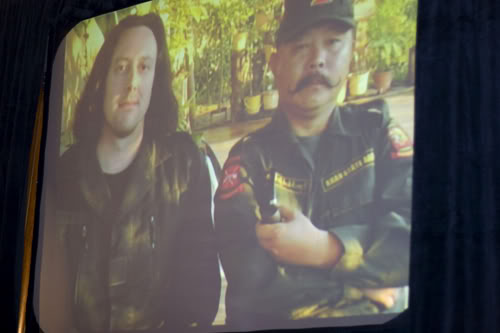
A slide from Cohen's presentation
Farrell helped facilitate Cohen’s admission to the world of famed musicians, a world that afforded him the opportunity to work with Bob Geldof and Bono in a crusade that would convince the G8 to forgive the debt of developing countries. This would be his indoctrination into the world of heroism, humanitarianism, and the fulfillment of a vision, seemingly unattainable by one man.
Interconnectivity, in Cohen’s eyes, transforms the unattainable into infinite possibility through pragmatism.
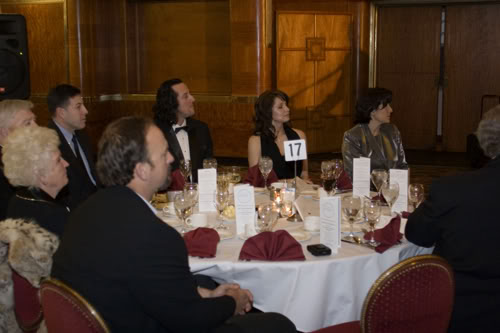
Aaron's family and friends
Cohen doesn’t seem himself as a single man making great strides for humanity, however. He sees himself as a man who has been blessed by the mentorship of visionaries before him, instilling in him the tools necessary to elevate lofty ideals into practical solutions. He is quick to attribute the fruition of his life’s work to the skills he learned from Geldof and the friendship he forged with Farrell.
“I was the luckiest guy in the world,” explained Cohen. “That I went into that high school after I graduated from college.”
The high school being the learning grounds he spent nearly decade on, working with Geldof, Farrell, Bono and others like them at the start of his ‘humanitarian’ career. Cohen credits Geldof with granting him the ability to view seemingly unimaginable visions as infinite possibilities.
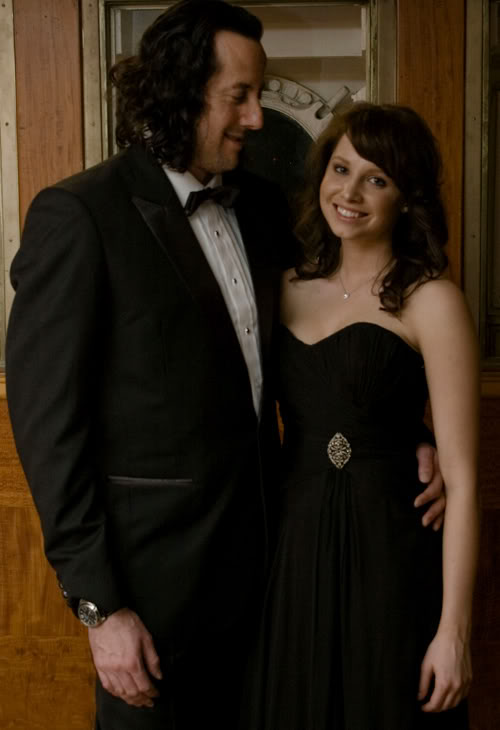
Aaron with his girlfriend
The real inception of Cohen’s work – what would become his life’s path – was predicated by his own personal tragedy. While Cohen was in Farrell’s employ and confidence, his mother became terminally ill. Cohen took a break from working with Farrell to return to Costa Mesa and stay with his mother through her illness. Upon his return to Orange County, Cohen pursued a Master’s degree at Vanguard University, where in his final thesis on The Jubilee, his fate would be realized. He attributes the Jubilee, particularly as it is laid out in the Book of Ezekiel, to affording him the opportunity of being in the right place at the right time throughout the course of his work.
Put simply, Cohen explains that, if you have an understanding of how the world will be played out (as detailed in the Jubilee), you have an understanding of where to be and when to be there.
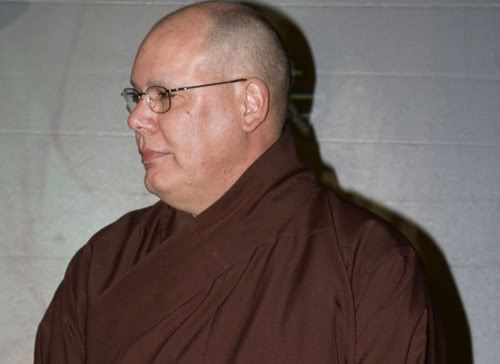
One of the four present day chaplains
One can almost taste Cohen’s excitement as he discusses the history and present implications of the Jubilee and the influence it has on his work. It has become his mission – relaying the vision of the jubilee.
“I’m the Jubilee dreamer,” He proclaims.
I’m floored by the strange pairing of intelligence and humility that pours out of Cohen in the next hour and a half. I can’t quite wrap my mind around how a person who has seen what he’s seen, lived what he’s lived, and accomplished as much as he’s accomplished can be so genteel. I couldn’t help but wonder aloud how he not only stays so positive, but also faces death on a regular basis without the fear any ordinary man might be swallowed by. He has, after all been shot at, poisoned and stalked. Cohen sums it up for me in a phrase I won’t soon forget, a phrase that may well become my new mantra.
“[You have to] learn to embrace divinity [as] a part of your family.”
And embracing divinity is at the crux of what Cohen does. Through divinity, Cohen exorcises the demons of society, strives so that the world may become a nation again, and fulfills what he considers the real vision – following his life path, which is Jubilee.
Interconnectivity. Integrity. Immortality.
Through Jubilee, Cohen establishes the synergy of interconnectivity, immortalizes the actions of heroes, who with the integrity of saints change the world one vision at a time.

